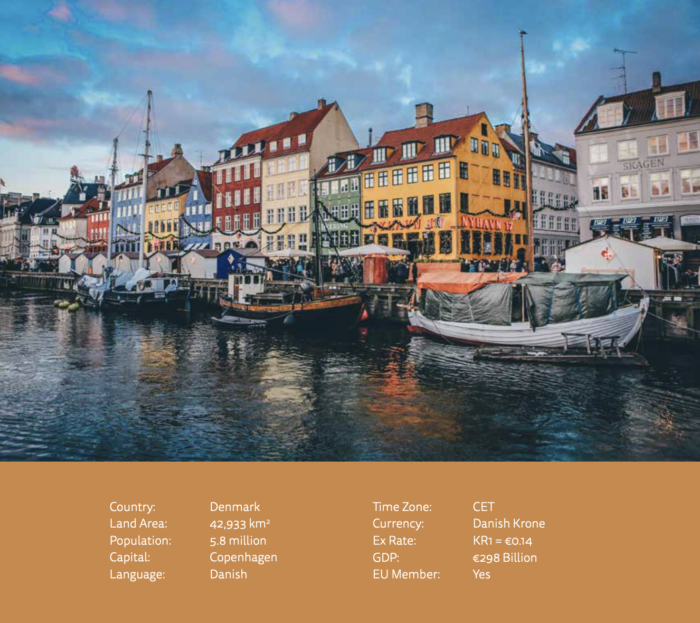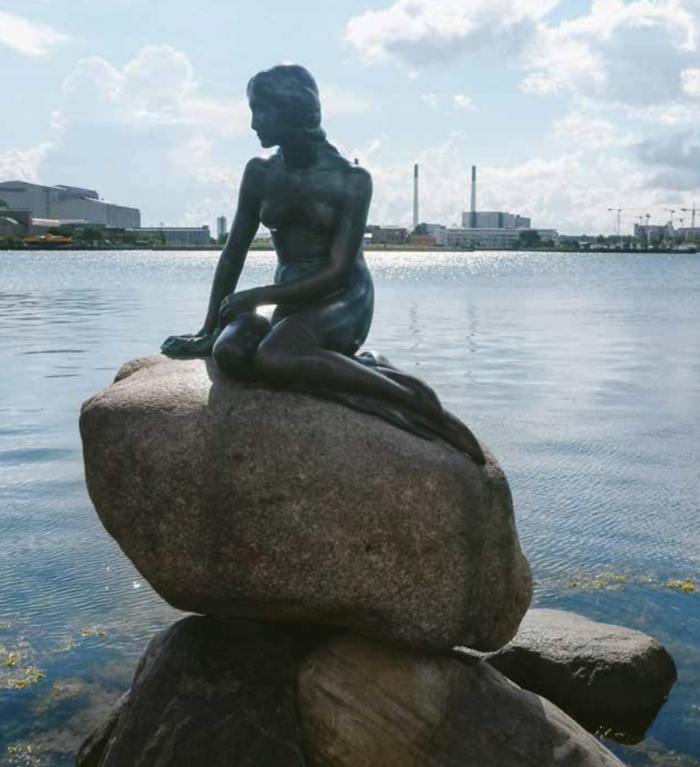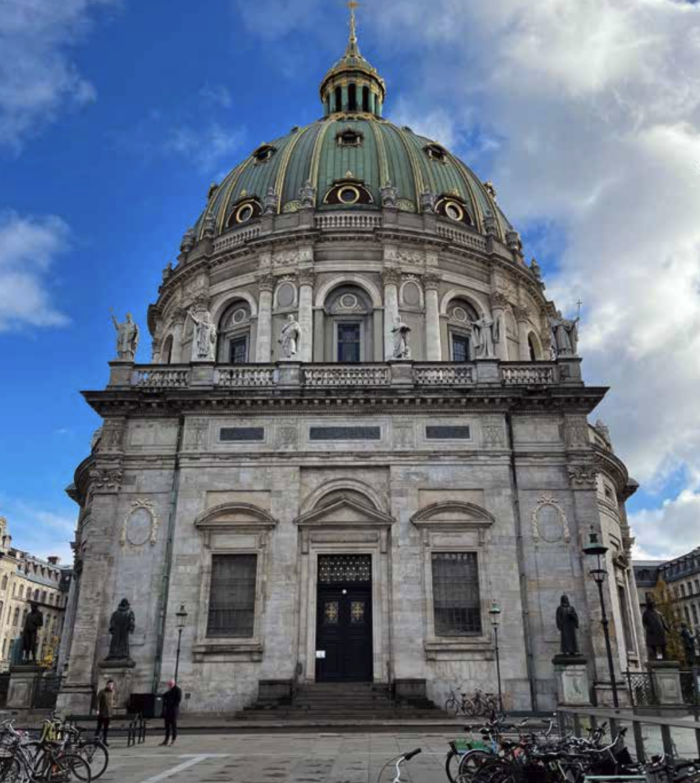
Denmark is known as the home of the Vikings who ruled from about 800 – 1050 AD. The Vikings were excellent sailors and shipbuilders and known for invading other countries. They controlled parts of England and France in the 11th century. During the reign of King Harald Bluetooth, the Danes converted to Christianity. The Kalmar Union (1397 – 1523) included Denmark, Sweden and Norway and was ruled by Queen Margarete I. Power struggles with the Germans continued over many decades in the 18th and 19th century. Denmark did not join World War I or II but was still invaded by Germany in 1940 and was eventually liberated on the 5th of May 1945.
Since the war, Denmark has rejected its previously neutral stance and was actually a founding member of the North Atlantic Treaty Organisation (NATO). It also joined the EU but has rejected many of its proposals including joining the Euro.
Principal Industries in Denmark
The main industries in Denmark are comprised of renewable energy, tourism, transport, agriculture and foodstuffs.
Other Important Industries
Denmark’s services sector contributes more than two-thirds of its GDP. Private services accounted for around two-thirds of productivity, and public services provide the remaining third. Wholesale and retail trade are the largest employer in the private sector and accounts for just over half of service sector employment. Public services have consistently accounted for nearly one-third of employment in services, mostly in health and education.
Doing Business in Denmark
While Denmark’s strong social welfare network is famous all over the world, the country is also an excellent place to do business. It is after all, a free-market capitalist economy with trading traditions that go back hundreds of years, and even within the Nordics, the Danes are known as a culture that enjoys a good business deal.
Denmark offers a pool of talented professionals who speak English well. The labour market is flexible, making it easy to find employees, and there is less litigation than in some other developed countries. Meanwhile, the business infrastructure is top-class, with a well-developed financial system.
Denmark is also home to some world-class companies in several industries, with a particular focus on renewable energy. The government has put in ambitious energy plans, and this has allowed Danish companies to emerge at the forefront of “cleantech”. The country aims to be completely free of fossil fuels by 2050.
Denmark is also particularly strong in the areas of biotech and life science as well as food innovation, which has spawned an industry that has had an impact both nationally within the country and internationally around the world.
The View from the Ground
When describing a country and its culture, you can write down all the facts and figures you like but if you want the full story, you need to get the perspective of someone with a lived experience of being there. That’s why we’ve asked Karl to give us his take on what it’s like to live and work in Denmark.
The Danes are highly experienced negotiators. You definitely shouldn’t celebrate a deal until the contracts are signed and the ink is dry. They are more than prepared to walk away from a deal if they’re not satisfied with the terms. So, it’s really up to you to put your best case forward and be convincing. They also drive a hard bargain and it’s not a quick sales process either. The Danes value relationships in business so they will want to develop that side of the process before getting down to the nitty gritty of negotiating a deal. Typically, and depending on what you’re doing, you will have a meeting with a manager to start with and then the next round will be with a director and possibly someone from procurement. The third meeting would be with the management teams, and this is where you will be invited to demonstrate your product and all the benefits. This may well be the second or third time you’ve presented but it’s good for business, so just go with it. By now, you should be ready to thrash out a deal. Clever salespeople use the long sales process to subtly negotiate all the way through so there are no nasty surprises in the final stages. Do expect the Danes to try to drive the price down though. They’re not being disrespectful, it’s just the way they do business, so try not to take it personally.
In terms of a network, you need people at different levels. If you know someone or someone can put you in touch with a contact at the bottom of the ladder, you can get into a company and work your way up. They will hardly ever search for you unless it’s for bigger deals where we’re talking like €400,000 or more. In that case it could actually be the production manager or a procurement manager who finds a solution that they like but they will still want to see a number of different options from several competitors.
I enjoy the networking part with dinners and having a beer or something. If you have a lunch meeting then you will have kind of a long lunch for one and a half to two hours, eating Danish delicacies. Many Danes are open so they are friendly and will talk to you, even more so after a beer or two. So, that’s nice and well, obviously it’s a business lunch so we have to talk about business, but we’d never conclude a deal in this way. When we sign the papers, it has to be in the chairman’s office or the management team’s office. One thing I notice and maybe it’s strange or maybe it isn’t, but we never sign papers in a conference room, it’s always in an office.
Usually, it is quite difficult for a Swede to make deals in Denmark, but I am generally allowed to because I’m married to a Danish woman. I also understand the language, it’s kind of similar to Swedish and Norwegian, So, when speaking in Danish we can understand each other, unlike in Finnish, which is totally different even though it’s in the Nordics. Regarding their trade, they prefer to make deals with Germany, Sweden and Norway. If they are really confident in their product, they will also try to enter the US market.
The Danish are very friendly, open people and easy to talk to both in business and in private. With enough notice, they are happy to accept meetings without a problem. You can’t do it on the day, like just rock up and say let’s have a meeting but if it’s set in advance, there’s no issue. Also, they will celebrate birthdays in the office but then you have the hierarchy from management down to the ground floor and that could create a kind of gap.
In fact, the hierarchy in Denmark is very strict. Employment law in the country is in favour of the employer as opposed to the employee, so it’s easier to lose your job in Denmark. If my memory serves me correctly, you can lose your job with as little as two weeks’ notice. This is occasionally abused by managers, but the Danes think that the flexibility in the employment law makes it easier to get a new job.
While Denmark is not a religious country, they will celebrate Christmas, but it is considered more for the kids than the adults and consequently, the festivities and celebrations are more child friendly. When the Danish do go wild though is on National Day. There is a huge party, everyone is out drinking and waving their Danish flags around. There are people dancing in the street and everyone has a really good time. The biggest party they ever had though was when they won the European Championships in 1992. The victory was made all the sweeter by the fact that the tournament was held in Sweden. The Danes have a little bit of an inferiority complex towards Sweden, so they always want to beat them at football.
There are a lot of start-ups in Denmark, but I think we are actually missing out on them because they don’t advertise themselves well. I’ve seen a lot of start-ups in the last couple of years that are really good, but nobody knows about them. Some of them are attempting to scale and some are not but quite a few of them are not focusing on tech or IT as they have moved more towards pharma. The hierarchy is a bit less in the start-ups, but it still exists. In the more traditional companies though it is at every level, right down to the manager above you and you’d be a little bit afraid of them. That’s because you can’t actually say no to them, and they expect total obedience. Of course, the managers must know that the workers’ union could call a strike at any moment. Usually, you see this in the aviation industry whether it’s the cabin crew or the baggage handlers who have some grievance and decide that they are not going to work again until their demands are met. It doesn’t always work of course but for the flight attendants, it usually works, and they tend to get what they want. Certainly, I know that I have been stuck on the ground at Copenhagen airport many times because of some sort of impromptu industrial action.
Lastly, the really weird thing about Denmark is that you can’t get a cup of coffee. I mean, they have a hot drink they call coffee, but it’s so far removed from what I’m used to that I don’t recognise it. I’m Swedish and I’m used to dark, strong coffee but there, it’s like they have one coffee bean that they use for the whole pot. What’s more, these are not isolated cases, it’s everywhere. Whether you’re in a hotel, a bar, an office, somebody’s house or a coffee shop, it’s all terrible. It’s so weak, you can see all the way to the bottom of the cup. It’s more like a weak tea than a coffee. If I’m asked if I want coffee in a meeting now, I just ask for water. I think the next time I go to Denmark; I’m going to bring a really big thermos flask.
Business Etiquette
The Danes like to be informal in meetings and don’t use titles such as doctor or professor. They are very modest and will often downplay their importance. This means the person you’re meeting may well have more influence than their title would suggest. Attire is also casual, and the Danes very rarely wear ties. Despite the laid-back atmosphere, the Danes are sticklers for punctuality so ensure that you are always on time for every appointment.
As is normal in most countries, there will be a little small talk before your start discussing business. In Denmark though, small talk is taken very seriously as a way of building relationships. There is a Danish motto that says, “Take care of personal relationships first and business second.” It is therefore advisable to engage in casual conversation before getting down to the details of negotiating a deal. Be prepared to invest in your relationship with your opposite number first before getting down to what you actually want.




